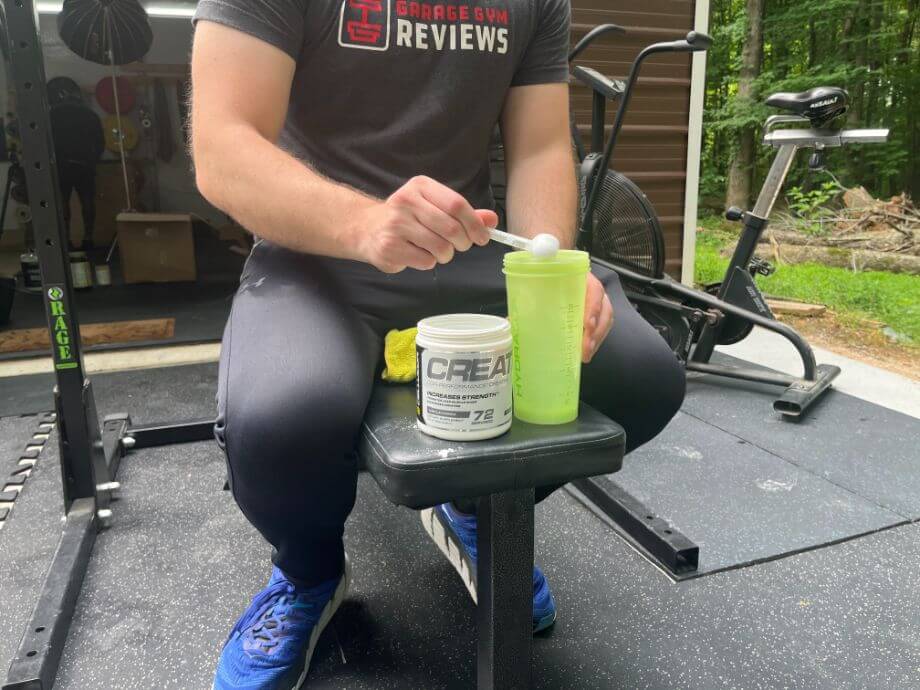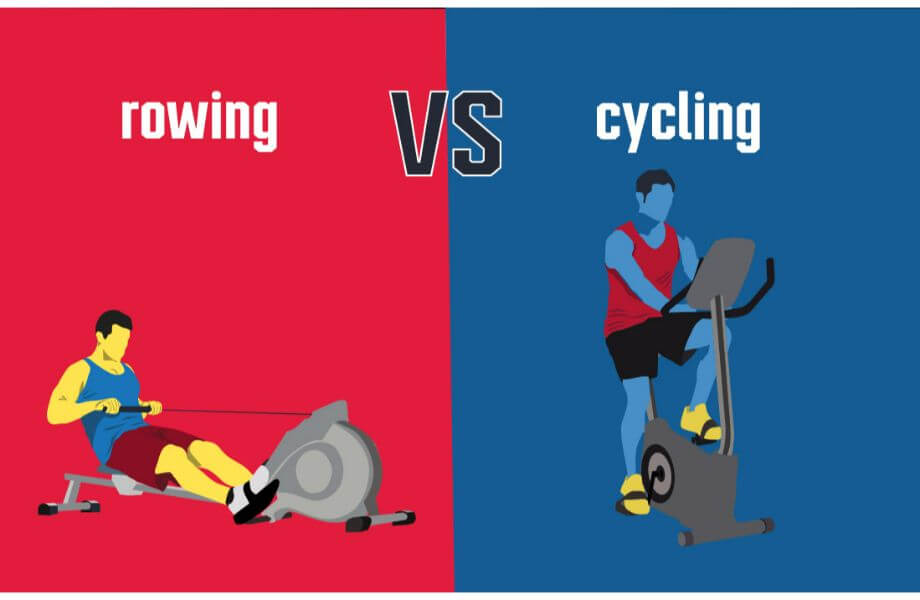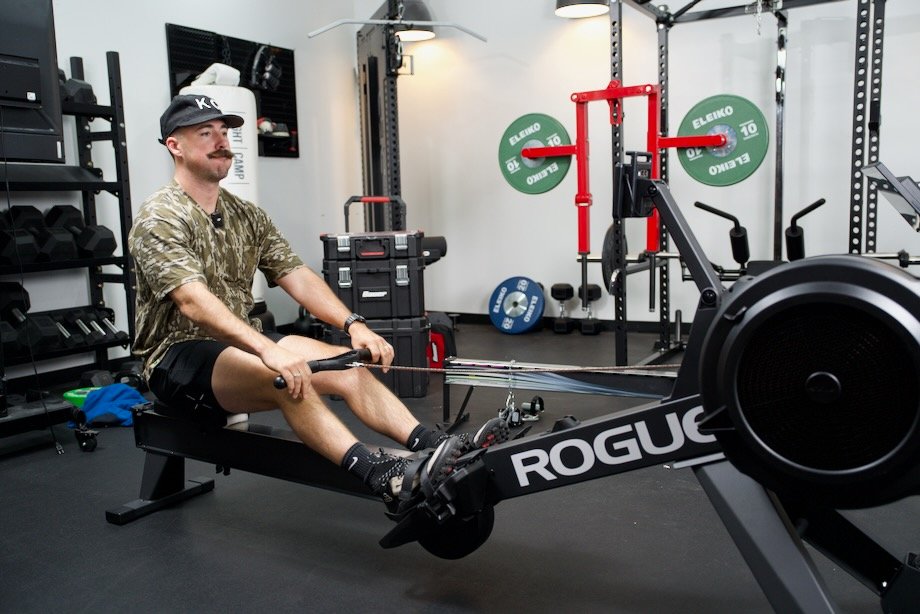One of the most popular supplements in the fitness world is creatine. As one of the most researched supplements1, creatine is largely used by bodybuilders, athletes, and fitness enthusiasts alike. The best creatine supplements provide a myriad of benefits, from increased muscle mass to brain health.
Still, the exact impact that creatine can have is a constantly debated topic, such as the effects of creatine with or without resistance training. Another question asked is: Does creatine help you lose weight?
Creatine isn’t a weight-loss supplement, so the answer is a simple no, correct? Well, the answer can be a bit more complex than that. I talked with Meagan O’Connor, RD, the sports dietitian for USA Weightlifting, about the benefits of creatine, and just what exactly creatine can help with. Read on to find out more.
Medical disclaimer: This article is intended for educational and informational purposes only. It is not intended as a substitute for medical advice. For health advice, contact a licensed healthcare provider.
Does Creatine Help You Lose Weight?
There is a short answer to this question, and then a longer answer to clarify the short answer. The short answer is: Although creatine is considered a dietary supplement, it is not a weight-loss supplement and it will not automatically decrease body weight.
So, no, creatine doesn’t help with weight loss.
For the longer answer, there are many benefits to creatine, and although it may not affect the number on the scale, it can be beneficial to someone whose goal is fat loss or muscle gain, or both. Let’s take a look at creatine and see what it can help in.
What Is Creatine?
A naturally occurring amino acid, creatine2 is produced by the liver, pancreas, and kidneys. After production, creatine is stored in your muscles and brain as phosphocreatine (or creatine phosphate); your body makes about 1 gram of creatine a day. Creatine is responsible for replenishing stores of ATP, or adenosine triphosphate, which helps fuel the muscles through high-intensity exercise and explosive movements.
Although it’s naturally produced by the body, your body relies on obtaining additional creatine through natural animal proteins consumed, such as red meat and fish. Also, creatine supplements can be an additional source.
Because creatine is not found in plant foods, supplementation may be important for people following a vegan diet. It’s also important for athletes and bodybuilders for athletic performance—more on that in a bit.
Types of Creatine
Most creatine comes in a powdered form, but can also come in capsules, or even prepared in a liquid drink. Within supplements, you’ll find many different types of creatine; among the more popular types, there are:
- Creatine monohydrate
- Creatine hydrochloride (HCl)
- Creatine citrate
- Creatine ethyl ester
Above and beyond, the most popular and researched type is creatine monohydrate, and for good reason. Although different forms of creatine have been linked with faster absorption rates, the International Society of Sports Nutrition3 says that none have the retention rates of creatine monohydrate. This February 2022 review4 also speaks of creatine monohydrate being the “gold standard” of creatine supplements due to high bioavailability and its researched efficacy and safety.
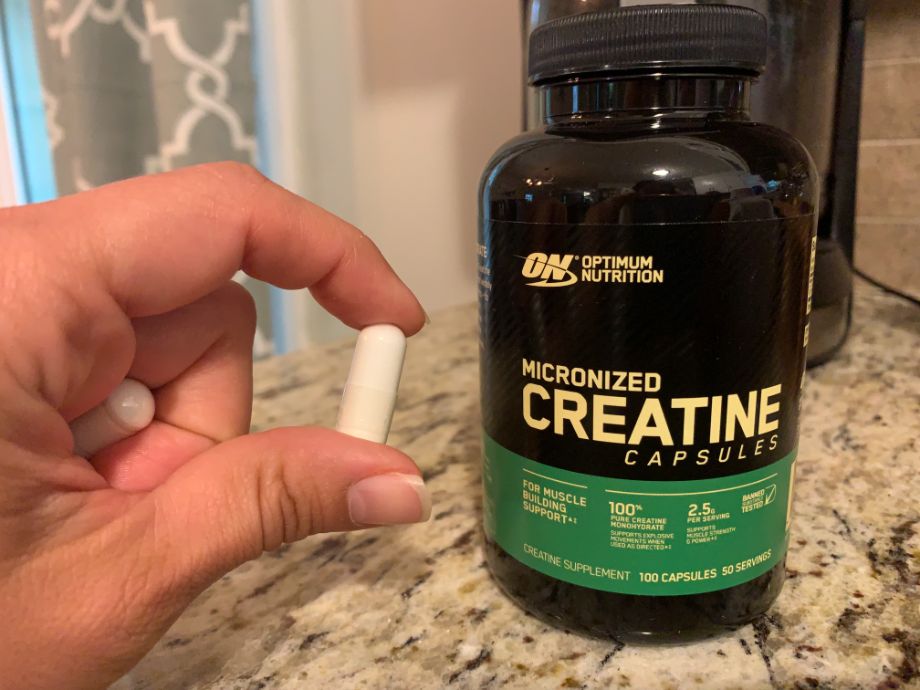
Benefits of Creatine
Before we get into how creatine performs for your weight loss goals, let’s look at some creatine benefits.
Improved Athletic Performance
Creatine has been shown to help improve the performance of athletes in a multitude of ways. A study published in Nutrients5 showed that creatine supplementation with strength training improved maximal strength levels in athletes in as little as four weeks.
RELATED: Best Creatine for Women
Because of its involvement in ATP synthesis to raise energy levels, creatine also builds on power output. You can see this in other studies, where one study from 20226 showed improved performance in treadmill sprints, and another study7 showed increased one-rep maxes in bench press and squat from those in the study. With its involvement in creating energy for muscle cells, creatine keeps muscles performing during strenuous exercise.
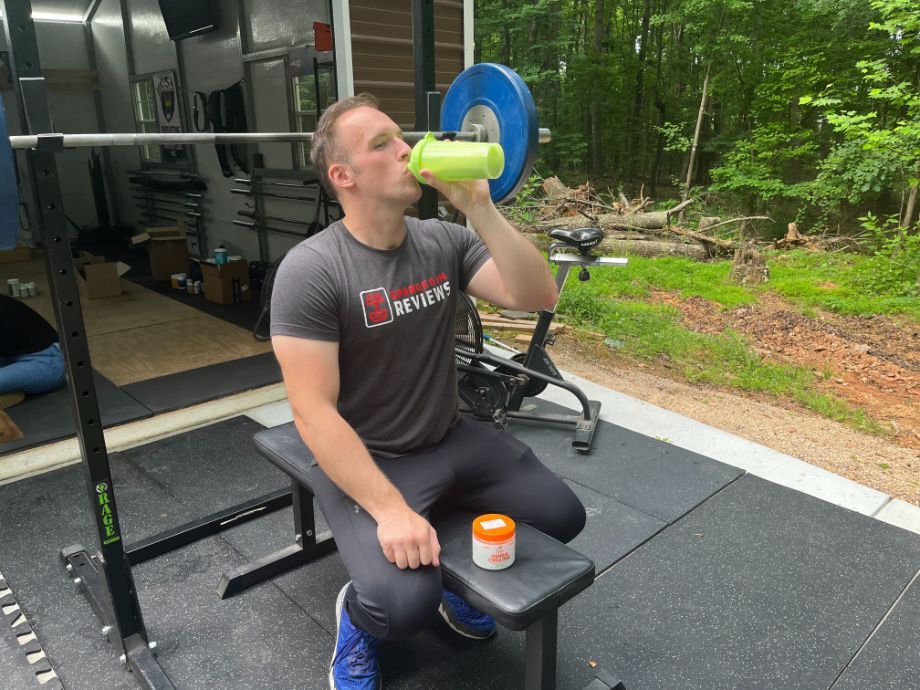
Increased Lean Muscle Mass
Creatine pulls water into the muscle cells for ATP synthesis; because of this, when someone begins taking creatine, bloating or water retention can occur. However, this drawing of water can promote muscle cell growth as well, especially when combined with resistance training.
One review from 20221 observed multiple studies and trials from the previous decade; in them all, participants who supplemented with creatine had a greater increase in lean muscle mass than those given a placebo.
Muscle Recovery
Creatine can also help speed along recovery in muscles after intense training sessions. According to a review from June 20218, creatine supplementation helps mitigate muscle damage and can restore lost power potential faster, possibly leading to better muscle recovery overall.
RELATED: Best Muscle Recovery Supplements
Brain Health
Although creatine is known for increasing muscle strength and muscle gains, there are more health benefits than just your performance in the gym or in a sport. Additionally, creatine has been shown to help promote brain function. Although research results are mixed, creatine has been linked to increased brain function in activities such as intelligence tests9 and memory10.
A Deeper Dive into Creatine and Weight Loss
Although we’ve established how creatine can’t help with weight loss, there are a number of factors that make creatine a beneficial supplement. If you’re looking to make positive changes to your body composition, then creatine is a great supplement to take with exercise and training.
Let’s dive into what that means for you.
Water Retention
When I asked Meagan if creatine could be used to help with weight loss, she said no. In fact, she reminded me about one of the few side effects of creatine: bloating. She notes, “Creatine draws water into the cells, meaning you retain more water in the body when you start taking creatine.” This water retention can actually cause you to gain weight in the first week of use—although that weight gain is just water weight.
RELATED: How Much Water Should You Drink With Creatine?
Changes in Body Composition
The effects of creatine supplementation may not directly be weight loss; however, there may be an indirect effect. While creatine doesn’t reduce the number on the scale, it has been shown to both increase lean muscle mass and decrease fat mass—while combined with resistance training.
A September 2019 study11 showed this correlation of fat loss in older adults. In the study, adults over 50 years of age performed resistance training while taking either creatine or a placebo; those who took creatine showed greater fat loss, as well as reduced body fat percentages, compared to the placebo group. Another study12 showed similar results with a younger group (up to 30 years of age).
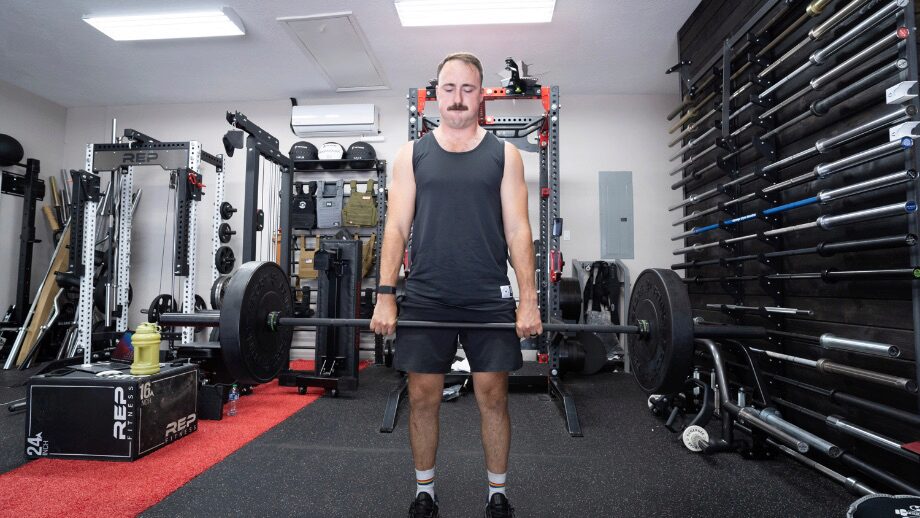
How does creatine help with restructuring your body composition? Meagan explains it simply: “Creatine helps with strength and power output, so as you train consistently and ‘better’ with creatine, then eventually your body composition will change in a positive manner.” Basically, creatine’s ability to help with strength, athletic performance, and muscle recovery all allow you to train more efficiently, and reap the total benefits of your cumulative training sessions.
Can I Lose Weight While On Creatine?
Although creatine won’t directly help you with your weight loss, it is possible to lose weight while on creatine. Many athletes will actually supplement creatine during a cutting phase for a competition in a weight class sport like weightlifting or wrestling. They use creatine to help maintain as much lean muscle mass as possible while losing fat and body mass.
What will determine your actual weight loss is your diet. A calorie deficit is needed to actually lose weight, meaning the calories you consume should be less than the calories expended in your training.
How Much Creatine Should You Take?
Typically, the amount of creatine you should take as a supplement depends on your goals. Although you get creatine through your diet and your body’s natural production, additional supplementation is recommended for athletes and those training.
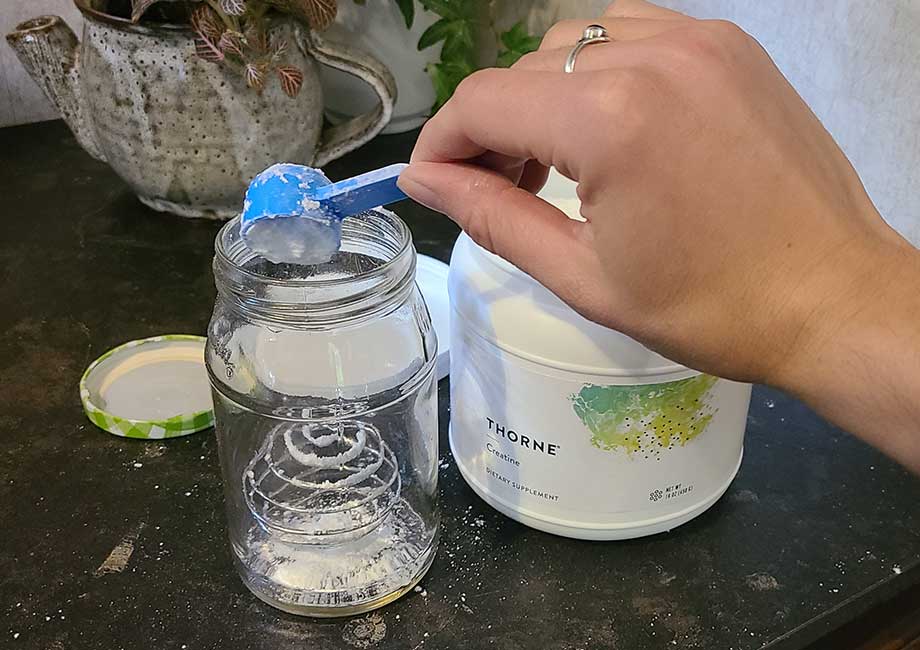
Most often, creatine is first taken in a loading phase to saturate muscle tissues with creatine quickly. Studies13 show that an optimal creatine loading phase lasts 5 to 7 days, and is a total of 20 to 25 grams per day, taken over 4 or 5 doses of creatine throughout the day. Afterwards, normal intake3 is usually around 3 to 5 grams each day; however, this amount will depend on the person. A larger athlete may need between 5 to 10 grams of creatine daily to adequately replenish the amino acid.
Does Creatine Help You Lose Weight? Final Thoughts
It’s much less accurate to say that creatine helps you lose weight, and much more accurate to say that creatine can affect your body composition—in multiple ways. The bottom line is that the only truly sure way to decrease the number on the scale is through a caloric deficit, and creatine doesn’t guarantee that. Here are some of the main takeaways discussed here:
- Creatine is not a weight-loss supplement.
- Shown to improve athletic performance, creatine has also been shown to increase lean muscle mass when combined with strength training and exercise.
- The first week of creatine supplementation can actually cause some weight gain due to water retention.
- Creatine has been shown to support positive changes in your body composition, with the addition of exercise, like strength training or cardio. Creatine may help in body fat loss and increasing muscle mass. While this may not make the number on the scale go down, it can help you lose inches..
- Athletes will use creatine during a cutting phase to help keep lean muscle mass while burning fat through training.
Does Creatine Help You Lose Weight? Q&A
Can I lose weight on creatine?
No. Creatine isn’t a weight-loss supplement, although it may support positive changes to your body composition. Recomposition is done through the reduction of body fat and the increase of lean muscle mass. However, aspects like exercise, diet, and sleep are bigger factors when it comes to body recomposition.
Does creatine burn belly fat?
While creatine has been shown to help with fat loss11, it will not target areas of the body for the fat loss. This is a long-held claim in weight training and exercise called spot fat reduction, and there is no basis for it. In any fat loss, specific parts of the body can’t be targeted.
Creatine, while not the driving catalyst, can assist you in losing fat, but not in losing fat in a specific part of the body.
Does creatine help you build muscle?
Absolutely, it can. A review from 20211 shows a common trend of weight training and creatine supplementation across several studies. With consistent exercise and weight training, creatine can definitely help in the building of lean muscle mass.
These statements have not been evaluated by the Food and Drug Administration. This product is not intended to diagnose, treat, cure, or prevent any diseases.
References
- Wu SH, Chen KL, Hsu C, Chen HC, Chen JY, Yu SY, Shiu YJ. Creatine Supplementation for Muscle Growth: A Scoping Review of Randomized Clinical Trials from 2012 to 2021. Nutrients. 2022 Mar 16;14(6):1255. doi: 10.3390/nu14061255. PMID: 35334912; PMCID: PMC8949037.
- Creatine. Mayo Clinic. Feb 9, 2021.
- Kreider RB, Kalman DS, Antonio J, Ziegenfuss TN, Wildman R, Collins R, Candow DG, Kleiner SM, Almada AL, Lopez HL. International Society of Sports Nutrition position stand: safety and efficacy of creatine supplementation in exercise, sport, and medicine. J Int Soc Sports Nutr. 2017 Jun 13;14:18. doi: 10.1186/s12970-017-0173-z. PMID: 28615996; PMCID: PMC5469049.
- Kreider RB, Jäger R, Purpura M. Bioavailability, Efficacy, Safety, and Regulatory Status of Creatine and Related Compounds: A Critical Review. Nutrients. 2022 Feb 28;14(5):1035. doi: 10.3390/nu14051035. PMID: 35268011; PMCID: PMC8912867.
- Wang CC, Fang CC, Lee YH, Yang MT, Chan KH. Effects of 4-Week Creatine Supplementation Combined with Complex Training on Muscle Damage and Sport Performance. Nutrients. 2018 Nov 2;10(11):1640. doi: 10.3390/nu10111640. PMID: 30400221; PMCID: PMC6265971.
- Bogdanis GC, Nevill ME, Aphamis G, Stavrinou PS, Jenkins DG, Giannaki CD, Lakomy HKA, Williams C. Effects of Oral Creatine Supplementation on Power Output during Repeated Treadmill Sprinting. Nutrients. 2022 Mar 8;14(6):1140. doi: 10.3390/nu14061140. PMID: 35334797; PMCID: PMC8950892.
- Hoffman J, Ratamess N, Kang J, Mangine G, Faigenbaum A, Stout J. Effect of creatine and beta-alanine supplementation on performance and endocrine responses in strength/power athletes. Int J Sport Nutr Exerc Metab. 2006 Aug;16(4):430-46. doi: 10.1123/ijsnem.16.4.430. PMID: 17136944.
- Wax B, Kerksick CM, Jagim AR, Mayo JJ, Lyons BC, Kreider RB. Creatine for Exercise and Sports Performance, with Recovery Considerations for Healthy Populations. Nutrients. 2021 Jun 2;13(6):1915. doi: 10.3390/nu13061915. PMID: 34199588; PMCID: PMC8228369.
- Rae C, Digney AL, McEwan SR, Bates TC. Oral creatine monohydrate supplementation improves brain performance: a double-blind, placebo-controlled, cross-over trial. Proc Biol Sci. 2003 Oct 22;270(1529):2147-50. doi: 10.1098/rspb.2003.2492. PMID: 14561278; PMCID: PMC1691485.
- McMorris T, Mielcarz G, Harris RC, Swain JP, Howard A. Creatine supplementation and cognitive performance in elderly individuals. Neuropsychol Dev Cogn B Aging Neuropsychol Cogn. 2007 Sep;14(5):517-28. doi: 10.1080/13825580600788100. PMID: 17828627.
- Forbes SC, Candow DG, Krentz JR, Roberts MD, Young KC. Changes in Fat Mass Following Creatine Supplementation and Resistance Training in Adults ≥50 Years of Age: A Meta-Analysis. J Funct Morphol Kinesiol. 2019 Aug 23;4(3):62. doi: 10.3390/jfmk4030062. PMID: 33467377; PMCID: PMC7739317.
- Arciero PJ, Hannibal NS 3rd, Nindl BC, Gentile CL, Hamed J, Vukovich MD. Comparison of creatine ingestion and resistance training on energy expenditure and limb blood flow. Metabolism. 2001 Dec;50(12):1429-34. doi: 10.1053/meta.2001.28159. PMID: 11735088.
- Gann JJ, McKinley-Barnard SK, Andre TL, Schoch RD, Willoughby DS. Effects of a traditionally-dosed creatine supplementation protocol and resistance training on the skeletal muscle uptake and whole-body metabolism and retention of creatine in males. J Int Soc Sports Nutr. 2015 Sep 21;12(Suppl 1):P2. doi: 10.1186/1550-2783-12-S1-P2. PMCID: PMC4594933.


